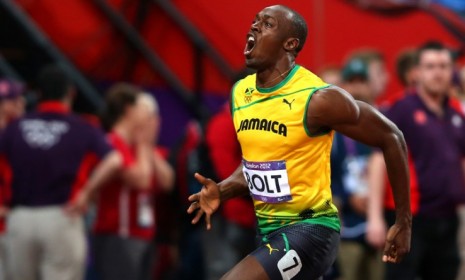How the BBC crushed NBC and brought Olympics coverage into the future
The British broadcaster is using technology to cover every second of every event, a gold-medal effort that has left NBC struggling to get on the podium

A free daily email with the biggest news stories of the day – and the best features from TheWeek.com
You are now subscribed
Your newsletter sign-up was successful
"On Sunday, Usain Bolt upheld his record as the world's fastest man in front of a worldwide television audience of 2 billion people," says Tim Stanley at Britain's The Telegraph. "Alas, none of them were watching it in America." NBC's hoary tape-delayed coverage of the Olympics has provoked an assault of complaints, particularly in the Twitterverse, where the network has become synonymous with the hashtag #NBCfail. And compared to the BBC, Britain's state-funded broadcaster, which offers its audience as many as 24 separate live feeds on a variety of media platforms, NBC looks especially old-fashioned. The BBC's goal is to air every second of every event as it happens, giving its audience "a more contemporary — even futuristic — TV Games," says Eric Pfanner at The New York Times. Here, a guide to what the British are calling "terrific telly":
How does the BBC air 24 live feeds?
Using the "red button" feature on their remote controls, viewers can switch to different BBC feeds that are being broadcast simultaneously. The BBC is airing a whopping 2,500 hours of live footage — the equivalent of about 100 days — over the course of two weeks. The red button feature is also available on the BBC's website (for British internet users only) and as a smartphone app, which has been downloaded by 1.5 million people. "We wanted to give people every venue, from first thing in the morning to last thing at night," Roger Mosey, the director of the BBC's Olympics coverage, tells The Times.
The Week
Escape your echo chamber. Get the facts behind the news, plus analysis from multiple perspectives.

Sign up for The Week's Free Newsletters
From our morning news briefing to a weekly Good News Newsletter, get the best of The Week delivered directly to your inbox.
From our morning news briefing to a weekly Good News Newsletter, get the best of The Week delivered directly to your inbox.
Is it overwhelming to absorb as many as 24 different sporting options?
"Watching the vast array of events is like being at a party where you don't know the guests," says Kevin O'Sullivan at Britain's The Mirror. But "suddenly you find yourself mysteriously gripped by ladies target shooting, handball, and the mesmerizingly repetitive canoe slalom contest." BBC officials were worried that viewers would feel "paralyzed by choice," says Nigel Farndale at The Telegraph, but they concluded that the preference for live sports is so pronounced that they could take the risk. The result has "revolutionized the way we watch the Games," says Farndale. Instead of a network telling you an overarching Olympics "story," the viewer determines what the Olympics is about. The BBC even offers a "digital dashboard" that allows viewers to customize their viewing schedules.
Has it been successful?
Yes. "Through the first six days of the Games," says Pfanner, "45.4 million Britons had tuned in to at least 15 minutes of BBC's coverage." Around 17 million Britons have used at least one of the red button streams. A record 17 million people tuned in to watch home-favorite distance runner Mo Farah win the 10,000-meter race, followed closely by the 16 million who witnessed Jessica Ennis triumph in the heptathlon. The BBC website reached a record peak audience of 8 million, and has had 29 million requests for its interactive videos.
A free daily email with the biggest news stories of the day – and the best features from TheWeek.com
Is it difficult for the BBC to pull off?
Yes. Matt Millington, the BBC producer in charge of the 24 streams, "likens the job to being an air-traffic controller," says Farndale. "You are constantly landing planes," says Millington, "while clearing other planes to take off, and all the time you have a dozen more planes stacked in the air." The BBC's team of announcers has grown hoarse with all the coverage, which requires them to work 18-hour days.
How else has the BBC used new technology?
The BBC and Japanese broadcaster NHK are filming the events in Super Hi-Vision television, which is 16 times clearer than standard high-definition television. "It's like looking through a glass window at an event," Mosey tells The Times. While most televisions aren't equipped for Super Hi-Vision, giant screens set up in public spaces in London and other British cities are rigged with the technology.
Will NBC imitate the BBC at future Games?
Perhaps. Though it has little financial incentive to do so. NBC's ratings are up impressively over the 2008 Beijing Games and a projected loss of $200 million has been replaced by cautious hopes for a "small profit." An average of more than 30 million American viewers watched six of the first seven nights of the London Olympics, with last Thursday's coverage earning ratings second only to the 2004 Friends finale.
Sources: The Guardian, The Mirror, The New York Times (2), The Telegraph (2),